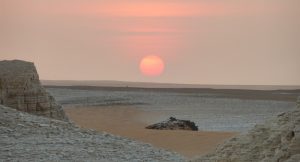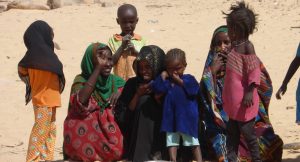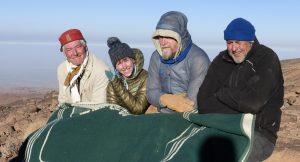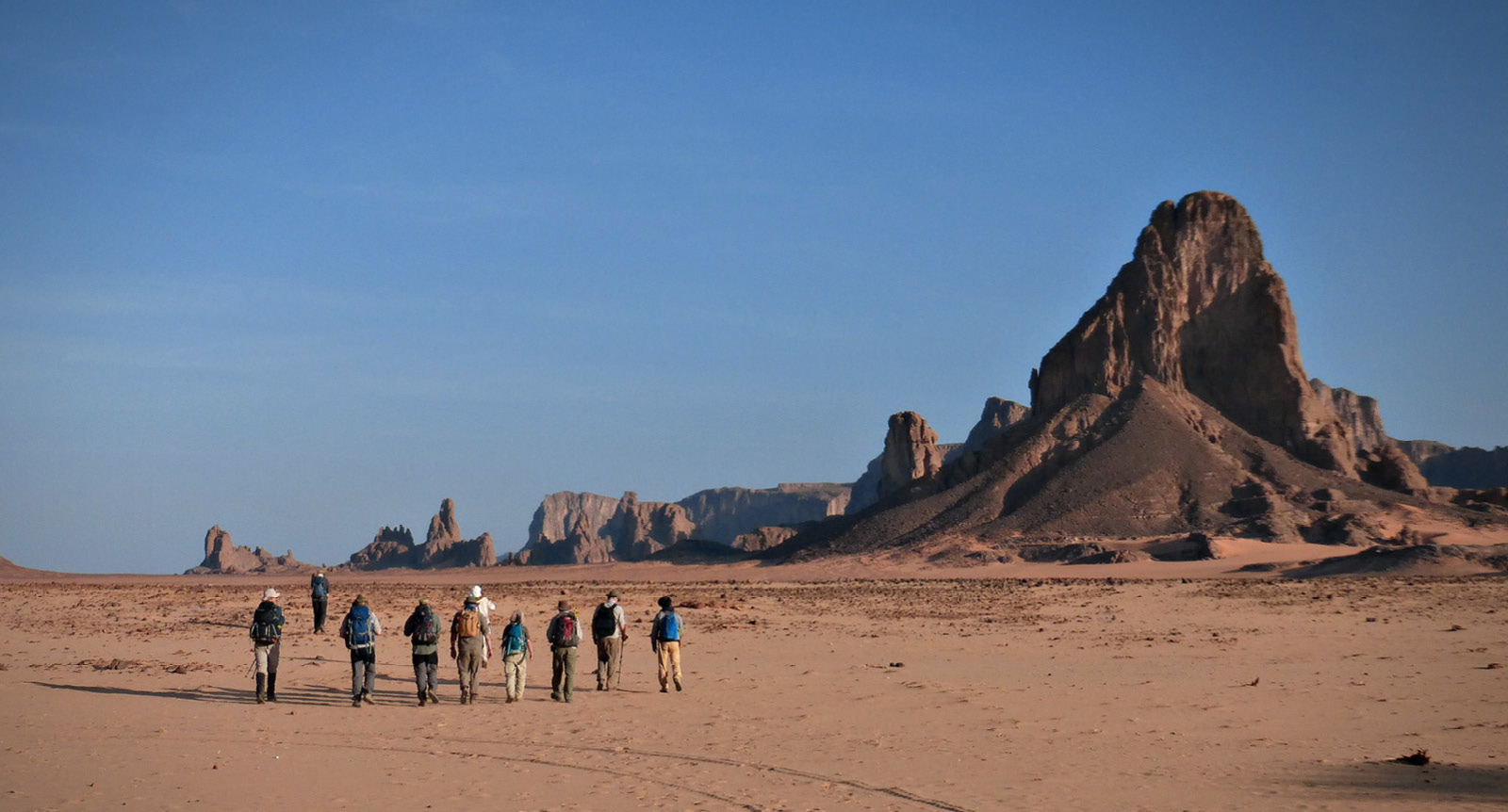Not much could better sum up the complexities of international geo-politics than the fact that I am sitting in a Chinese owned and run hotel in the Central African Republic of Chad listening to Frank Sinatra’s famous song ‘My Way’ being sung in Mandarin. While eating a croissant. It’s a bizarre place and I’m not just talking about the hotel, I’m talking about the whole country.
I came here four weeks ago to explore Emi Koussi, the Sahara’s highest mountain, located in the Tibesti massif in the north east of the country. Chad is an old French colony and is, for now at least, a relatively stable democracy. Emi Koussi, a dormant volcano, lies in a region that is part Chad, part Libya, part self-governing throwback to a different time. Having grown up reading the adventure travel books of Wilfred Thesiger, this expedition has seen me following in his footsteps.

As with much travel in the poorer countries of the world, most journeys start with many days sitting in a Toyota. I’ve learnt long ago on previous journeys not to make the mistake of calling them ‘Jeeps’ or ‘Land Rovers’. You only do that if you want to make your driver really hate you. It’s a thousand kilometres from the Chadian capital of N’djamena to Faya Largeau, the start of our trek into the mountains.
The first 80km is tarmac road. After that, either the oil or the money ran out. More likely still is that the oil money ran into somebody’s Swiss bank account, for Chad is one of the most corrupt countries in the world. Whichever way you look at it, the road is truly awful. If the pot holes don’t eat your wheels, there is an awful lot of road kill to avoid, mostly donkeys and goats. Mercifully the road soon runs out altogether and from now on we are on sand and rock and can make a little more speed.

Travelling north, our journey takes us through a cross-section of the Sahara. We begin surrounded by savannah in the relatively green south, then progress through the more sparse Sahel, until by day three we enter the Sahara desert proper. For now, we are in ‘Beau Geste’ territory (the adventure novel by P. C. Wren detailing the antics of three English brothers in the French Foreign Legion).
We camp at night under thorn and palm trees, counting shooting stars to send ourselves to sleep while a gentle desert breeze whispers among the tree tops. Our local fixer, Andrea, is an Italian, and dinner at night turned out to be risotto with roast lamb, or perhaps spaghetti, or cous cous. A bottle of Campari magically appeared, as did some olives. I’m really not complaining: the expedition food I’m used to usually involves ration packs and an unhappy night digging holes in the sand dunes every half hour! Andrea and our other guide, Luca, are both dark and handsome – if you like that sort of thing – and each night the group soon settles down into campfire and bedtime story mode.

There aren’t always warning signs when you start driving through minefields. You just gradually realise that some of the stones at the side of the road are painted red on one side and white on the other. And everyone goes a bit quiet. Because slowly we’ve all realised the same thing. This could go horribly wrong.
We’ve left Faya behind and everything’s changed. Libya invaded Chad a few years back and in the north there are mines…and rocket parts…and the things marking the path through the rocks are spent ammunition shells. We are heading into the mountains to meet the Toubou. It’s their land and their mountain: and now we ideally need some of their camels.

Back in Thesiger’s day, a kindly Toubou woman lent him and his companion a couple of camels and gave him a goatskin of milk, so we thought this should be easy enough to sort out. Now, I know as well as the next man that everything you read on the internet is true and entirely reliable. So, while there is gold in these here hills, the government back in N’djamena have locked prospecting down and no one is allowed to go digging unless it’s under state sanction. Also the border with Libya has been closed so there is no way of taking goods backwards and forwards. As with so much else in the real world, turns out the Internet knows nothing.
What we think is going to be an easy gig for these guys – carrying our bags and showing us the way up the mountain – turns out not to be entirely their cup of Chai at all. Village after village proves to be empty of men because the Tibesti is in the grip of a gold rush. In Andrea’s recent experience, seven out of 10 of those who have gone looking for gold in recent years now have multiple wives and land cruisers on both sides of the border. And the border that is supposed to be shut is actually as leaky as a sieve, with this part of Chad in reality being utterly dependent on supplies coming south from Libya, the mountainous border crossing being much easier than the 1000km desert crossing from the south. Make of it what you will but there are a lot of Ak47s around, which may have something to do with the Toubou being at war with pretty much everyone.

We haggle. We finally get somewhere. After what seems a lifetime, we head off with 15 camels and an unknown number of cameliers. Back in Faya we picked up a local Toubou head man, who became our intermediary with the tribesmen. After a night of shouting and theatrical stomping around we seem to have struck some sort of deal and finally we start walking. The head man sways along at the front in traditional robes with his dagger characteristically hanging from his left elbow. Later, his son Omar shows me a deep gash in his back where he had recently been stabbed…these daggers aren’t as ornamental as I thought. Having completed his pilgrimage to Mecca, the head man is afforded the honorary title of ‘Al Haji’. At first I think they’re calling him Elijah and in my mind it all starts to get a bit biblical as I follow him across the desert. And the scenes are indeed almost biblical; ignore the glimpses of satellite phones poking out of robes and the odd AK 47 and this could all be thousands of years ago.
It may prove to be easier for a rich man to get into the kingdom of heaven than it is to get a camel up Emi Koussi, but I know I’ve only tried to do one of those things, and it’s bloody difficult. I won’t dwell but camels have their own timetable and quite often it turns out to be ‘12 minutes’ walking followed by four hours’ sitting down.’ This year has been exceptionally hot and many of the stops we make for water are fruitless. As we head into the mountains, water can be found in gueltas, shallow puddles or dry water courses where with a little digging, reasonably clean water can be collected. The camels get first go: if they die we’re all screwed.
We stop to see cave paintings of giraffe and long horn cattle and of figures hunting. It’s all evidence of gradual climatic change over thousands of years; this land has long since become too dry to support such abundant life. Among the sands we find countless tiny sea shells and even the preserved bones of fish millennia old, a reminder of a time when all this was under water.

Little by little the summit starts to come into view. The landscape has now turned harsh and unforgiving. Volcanic debris, sharp outcrops of lava rock, wind- and water-scoured granite and very little life. The days remain hot, we are plagued by flies and the wind blows hard. The nights are shockingly cold. Our water carriers are frozen solid in the mornings. After two weeks we reach the summit. We are 3,500m up. The views over the Sahara are truly epic. Flows of laval rock millions of years old stretch out below us like tentacles into the distant desert sands, while below us the collapsed caldera of the volcano stretches our over 10km wide.
Among us we have a catholic priest. He is quite literally on a mission as he’s persuaded someone to finance his quest to summit the highest peak in every country in the world. If he manages to do it, he gets an orphanage. I turn around and he is quietly celebrating mass. I think this is peak number 191. He did Everest several years ago. The only way is now down. And it’s going to take another week to get out of here. Three more days of walking with the camels and then another three days driving back to the capital.
With our goal accomplished it just becomes a task to keep putting one foot in front of another. The wind doesn’t let up and I’ve camped out every night for nearly three weeks. My clothes are stiff with grime and sweat. If you sat next to me on the tube you’d get up and move. This country is hard and takes on a god-forsaken cast. Nearly all of our group of ten have succumbed to some sort of heat-related illness. Humour turns lavatorial then dark. When the devil had tried to tempt Jesus with these views, I’m not entirely surprised he gave him the old ‘thanks, but no thanks’ and carried on doing the good work.



Eventually we hit Yi-Yera. If you ever find yourself in the neighbourhood, the hot spring is quite nice. Although if it had a trip advisor entry I’d have to suggest that the locals didn’t combine an attractive oasis and thermal springs with a goat slaughter-house and outdoor toilet. But I’m just being picky. The trouble with having a wash at this point, apart from tip-toeing over severed goat legs and faeces, is that you just end up putting back on clothes that would be best cleaned on the ‘incinerate’ setting of your washing machine if you were back home. As I take my shirt off a Toubou looks me up and down, and I think this is a reference to my tattoos; looks me in the eye and says, “Michael Jackson”. The Toyotas are here to meet us and we’re soon en route again; we’re a day late so this puts us on a tight schedule to get back to N’djamena.
Days sitting in the vehicles become arse-numbingly long. There are occasional stops, the most exciting being seemingly random road blocks manned by teenage soldiers.At one of these, a young lad stumbles out of a roadside tent in full uniform, apart from his bare feet, juggling an M16 and a copy of the Koran, one of which is worryingly pointing at my head. Northern Chad is predominantly Muslim while the south tends to be Christian. Although at this point I can’t say I care that much – I just wish he’d stop pointing the gun at me.
At Gouro we stop while one of our drivers pays a visit to his mother. Thesiger visited on the way through in 1938. He described it as pretty, it isn’t any more. The lads from here are famous for being good drivers. It’s so far from anywhere that you have to be. His mother has made us fresh bread and date paste and we descend on it like locusts, bread having been the one thing we’ve all missed these last weeks. Twelve hours out of N’djamena everyone starts to relax. Our guides have done their job and the medics among us have had little to test their skills. The old black and white film ‘Ice cold in Alex’ becomes a topic…we’re all dreaming about ice cold beers and chilled glasses dewy with condensation and waiting for us in the hotel bar.
Suddenly one of the lead vehicles pulls over to the side of the road. Someone has collapsed and started fitting. Heat exhaustion and exposure can come on terrifyingly quickly and can be fatal. He’s hosed down with bottles of cold water and seems to recover, the only thing is to head for hospital as quickly as possible. As quickly as the lousy roads permit. Hours later, after a drive that’s scared the life out of all of us, he’s safely in hospital and well enough to fly home. Whatever the cause, we’ve all learnt a lesson.

So here I am, back in the bar, listening to ‘My Way’. I’ve travelled weeks and years back in time to probably one of the most remote and inaccessible places on earth. I’ve meet a tribe of people whose lives have remained largely unchanged for thousands of years and who will doubtless continue to be tricky folk to all and sundry for years to come, and I can’t blame them. I’ve had weeks of the best sleep I’ve ever had, free from prompts and pings and updates and I’ve been inspired by people’s strength and tenacity under difficult circumstances.
What have I learned? With absolute honesty: nothing. All I’ve got is more questions. How will things work out for isolated and independent tribes like the Toubou? The march of phone masts across Africa is unstoppable and what will they bring, progress? Middle-class thrill seekers like me, masquerading as adventurers, do we add anything to the sum of human experience or do we sow dissatisfaction with our expensive first-world possessions and long life expectancy? Are we just voyeurs indulging in poverty porn? As I look around the bar at the hotel, everybody is head down engrossed in prodding their mobile phones.
“What a relief it is in a world yearning for authenticity to know that though we have blighted our habitat, there is an unspoiled place in the planet, and a people who have defied modernity by clinging to their old ways. The past recaptured. Isn’t it pretty to think so?” (Paul Theroux, Last Train to Zona Verde).
Peter Colby joined a Secret Compass expedition this January to explore northern Chad’s Tibesti Mountains and to climb Emi Koussi, the Sahara’s highest point at 3,445m. Browse more expedition opportunities with Secret Compass here.
Post tags:
